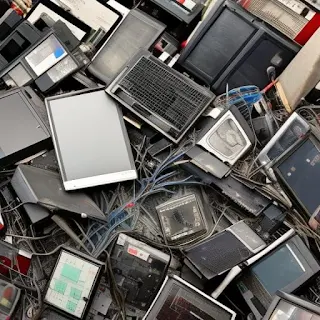Export E-Waste, Polluting Neighborhoods, The E-Waste Menace
The export of U.S. e-waste to Africa is driven by economic factors, as it is cheaper to dispose of waste in countries with less stringent regulations. Disposing foreign waste in African nations led to environmental degradation, health hazards, and social consequences. Communities such as the Agbogbloshie neighborhood of Accra suffer from pollution-related health problems.
The E-Waste Menace Neighborhood Takeover of Agbogbloshie
According to the Global E-waste Monitor report, the United States generated approximately 6.9 million metric tons, around 15.2 billion pounds of e-waste in 2019. On a per capita basis, the U.S. was one of the countries with higher e-waste generation. In 2019, it was estimated that the U.S. generated approximately 20.7 kilograms, around 45.6 pounds of e-waste per person.
Ghana receives discarded electronics and electrical equipment, particularly in the Agbogbloshie neighborhood of Accra. Importing e-waste and unregulated recycling practices in this area have led to environmental contamination and health crises. Contact with hazardous materials in electronic waste can cause skin problems, including irritation, rashes, and chemical burns.
E-waste includes a wide range of devices and equipment, with some of the most common categories being information technology and telecommunications equipment such as gaming consoles, computers and smartphones, large household appliances, televisions, smart home devices, and headphones.
Electronic waste contains heavy metals such as lead, mercury, cadmium and toxic chemicals like brominated flame retardants. When these materials are burned or improperly disposed of, they leach into the soil and groundwater, posing serious health risks.
People living in and around the neighborhood of Agbogbloshie are without proper training, equipment, or oversight to recycle electronics and electrical equipment. Workers, including adults and children, manually dismantle electronic devices to recover valuable materials like copper, aluminum, and precious metals. On average, individuals in Agbogbloshie earn between $1 to $5 per day.
Burning is one of the primary methods used in Agbogbloshie to extract valuable metals from electronic waste. Workers often burn electronic components. This practice releases toxic fumes and pollutants into the air, which settle on the soil, contaminating it.
Inhalation of toxic fumes and particulate matter released while burning electronic waste leads to respiratory issues. These include chronic cough, bronchitis, and exacerbation of pre-existing respiratory conditions like asthma.
Unfortunately, prolonged exposure to certain toxic chemicals, such as polychlorinated biphenyls (PCBs) and brominated flame retardants found in electronic waste, increases cancer risk. Like many other cities worldwide, Accra has experienced rapid urbanization, with people migrating from rural areas to seek better economic opportunities in the city.
The neighborhood of Agbogbloshie is roughly the size of Hollywood, Los Angeles, California, Williamsburg, Brooklyn, New York City, The Mission District, San Francisco, Logan Square, Chicago; and Dupont Circle, Washington, D.C. The global trade in electronic waste, including the importation of used electronics, has contributed to the exploding growth of informal recycling sites like Agbogbloshie.
Did you know?
The word Agbogbloshie is pronounced as AH-gbohg-BLOH-shee. Agbogbloshie is a neighborhood in Accra, the capital city of Ghana. On average, individuals in Agbogbloshie earn between $1 to $5 per day from the export of U.S. e-waste, which causes pollution-related health problems.


























